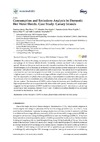Identificador persistente para citar o vincular este elemento:
https://accedacris.ulpgc.es/jspui/handle/10553/69275
| Título: | Consumption and Emissions Analysis in Domestic Hot Water Hotels. Case Study: Canary Islands | Autores/as: | Diaz Perez, Francisco Javier Diaz Martin, Ricardo Perez Trujillo, Francisco Javier Diaz, Moises Guardiola Mouhaffel, Adib |
Clasificación UNESCO: | 3303 ingeniería y tecnología químicas | Palabras clave: | African Dust Energy Design Simulation Systems, et al. |
Fecha de publicación: | 2019 | Publicación seriada: | Sustainability (Switzerland) | Resumen: | We analyze the energy consumption of domestic hot water (DHW) in the hotels of the archipelago of the Canary Islands (Spain). Currently, systems use fossil fuels of propane and gas oil. However, this paper analyzes several alternative systems which focus on renewable and mixed energies, such as biomass, solar thermal and heat pumps systems associated with an electric generation with photovoltaic solar panels for self-consumption. The carbon footprint generated is calculated for each method of generation of DHW. In our analysis, we demonstrate that by using a high-temperature heat pump with an average coefficient of performance (COP) equal to or greater than 4.4 associated with photovoltaic solar panels, a zero-emission domestic hot water system can be achieved, when the installation area of the photovoltaic solar panels is equal to that of the solar thermal system. The importance of DHW's carbon footprint is proven, as is the efficiency of using high-temperature heat pumps associated with photovoltaic solar panels. As such, such mixed system suggests that the generation of DHW would have zero emissions with maximum annual savings according to hotel occupancy, between 112,417 and 137,644 tons of carbon dioxide (CO2), compared to current boilers based on fossil fuels. | URI: | https://accedacris.ulpgc.es/handle/10553/69275 | ISSN: | 2071-1050 | DOI: | 10.3390/su11030599 | Fuente: | Sustainability[ISSN 2071-1050],v. 11 (3) |
| Colección: | Artículos |
Vista completa
Citas SCOPUSTM
11
actualizado el 08-jun-2025
Citas de WEB OF SCIENCETM
Citations
10
actualizado el 22-feb-2026
Visitas
73
actualizado el 10-ene-2026
Descargas
68
actualizado el 10-ene-2026
Google ScholarTM
Verifica
Altmetric
Comparte
Exporta metadatos
Los elementos en ULPGC accedaCRIS están protegidos por derechos de autor con todos los derechos reservados, a menos que se indique lo contrario.
